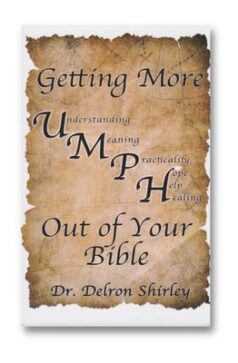Just in case you haven’t heard – fad diets don’t work. We’ve all seen them – the people who lose a tremendous amount of weight and then suddenly “find” it all again. In fact, I remember one evangelist who came to preach at our church on a fairly regular basis. On one occasion, he showed up with a totally “new” body – sixty-five pounds lighter than his portly old physique. His sermon that day was about willpower, and he illustrated it by telling how he had lost all his weight. When he returned the next time with the body that we were accustomed to, I genuinely wanted to demand that he return the offering I had given him when he preached his message on willpower – after all, it apparently didn’t work and, therefore, I should have been entitled to a refund.
In just the same way that hit-and-miss regimens cannot yield lasting physical results, irregular spiritual diets will not produce permanent results in our lives. In the last chapter, I made reference to the Lord’s commandment to Joshua as he was taking the reins after Moses’ death, but let’s go back and examine it a little more closely, This book of the law shall not depart out of thy mouth; but thou shalt meditate therein day and night, that thou mayest observe to do according to all that is written therein: for then thou shalt make thy way prosperous, and then thou shalt have good success. (Joshua 1:8)
Notice that the Lord said that he was to meditate in His law. The term “meditate” refers to regular and repeated study of the Word of God – the continual pondering upon a concept until it becomes part of you. Meditation is often likened to a cow chewing and digesting its cud until it actually becomes part of the bovine’s body makeup. Such is the power of regular and repeated meditation on the Word of God as opposed to a casual hit-or-miss approach or even an intensified focus that is not properly balanced – the fad diet approach that focuses on just one aspect of the well-balanced diet necessary for good health. Jesus validated the power of a regular and well-rounded intake of the Word of God in John 15:7, If ye abide in me, and my words abide in you, ye shall ask what ye will, and it shall be done unto you; David confirmed another aspect of the necessity of proper scriptural nutrition in Psalm 119:11, Thy word have I hid in mine heart, that I might not sin against thee; he testified to an additional benefit of a healthy scriptural diet in Psalm 119:130, The entrance of thy words giveth light; it giveth understanding unto the simple; and James emphasized yet another dimension in James 1:21, Receive with meekness the engrafted word, which is able to save your souls. In the same way that what a cow eats literally becomes part of that cow, meditation on the Word of God can literally make these promises part of the actual fiber of our very being – not just the up-and-down results that we see with lose-and-regain fad diets.
It is this sort of dedication to the Word of God that produces hope, help, and healing in our lives. More than likely, we have all seen – and possibly even been – Christians who drag to church each Sunday after barely making it through the week. They can’t wait for the altar service at the end of the sermon so they can have someone pray for them for their healing, finances, or family problems. They are so beaten up by the devil that they probably couldn’t make it from Sunday to Sunday without the mid-week service “booster shot.” What’s so pathetic about their situation is that they don’t understand why all this is happening to them – after all, they are “standing on the Word and quoting their promises every day!” My pastor has a splendid answer, “They’re just spitting out gospel seeds, not producing spiritual fruit.” In a previous chapter, we looked at Jesus’ analogy of the kingdom of God to a seed that was planted. He said that the farmer slept and rose night and day to discover that the seed sprouted, grew, and produced fruit – first the blade, then the ear, after that the full corn in the ear. Jesus then added the interesting comment that the farmer didn’t know how the whole process worked. (Mark 4:26-29) The difference between the seed and the full corn in the ear is the gestation period while the seed is in the ground, taking root, and being transformed. The same is true with the Word of God – it must be allowed to take root in our lives and mature into fruit. Believers who hear preachers and teachers talk about how the Word of God brings hope, help, and healing and then repeat what they have heard are simply “spitting out the seeds” they have heard; however, those who allow the seeds to germinate through regular meditation begin to bear fruit. Even though they don’t understand how exactly it is happening, they are seeing the results.
Another aspect of the directive that the Lord gave to Joshua was that his meditation was to be day and night – meaning that it was to be consistent and perpetual. Of course, this was not a new concept that God came up with for Joshua; it was the same mandate that He had already declared over all His people, And these words, which I command thee this day, shall be in thine heart: And thou shalt teach them diligently unto thy children, and shalt talk of them when thou sittest in thine house, and when thou walkest by the way, and when thou liest down, and when thou risest up. And thou shalt bind them for a sign upon thine hand, and they shall be as frontlets between thine eyes. And thou shalt write them upon the posts of thy house, and on thy gates. (Deuteronomy 6:6-9) David dedicated the one-hundred-nineteenth psalm – the longest chapter in the Bible – to expressing how valuable his consistent reliance upon the Word of God had become to him. He expressed his intimate love for God’s Word as being so intense that he literally couldn’t stay away from it; he was essentially addicted to God’s Word! Notice how he kept coming back to his desire to constantly and regularly feast on the Word of God. In verses fifteen, twenty-three, and seventy-eight, he spoke of his habit of meditating on the precepts of God – a process that he described in verse ninety-seven as being an all-day preoccupation. He declared that he would never forget the Lord’s Word in verse sixteen, and, in verses twenty and forty-four, he affirmed that his dedication to the law of the Lord was at all times and continually for ever and ever. Additionally, he testified in verses fifty-five, sixty-two, and one-hundred-forty-eight that the intensity of his love for the Word of God literally kept him up at night.
There is more that we need to learn from the one-hundred-nineteenth psalm, but first I want to ask a question, “Did you realize that it is actually possible for an obese person to suffer from malnutrition?” It’s true that many people actually overeat foods that lack adequate nutrients. Perhaps the foods they choose are overly processed and have had the nutrients stripped away, perhaps the foods were grown in depleted soil that is deficient in necessary nutrients, perhaps the people simply pick and choose in what I have referred to as a “cafeteria diet,” or perhaps they simply can’t obtain proper food because of their economic situation – whatever the reason may be, they eat plenty but are not properly nourished by what they eat. The point here is that it’s not just the quantity that we consume that is important; the quality of what we eat is just as important – a truth that is more than abundantly demonstrated in this psalm. Notice all the different ways in which David referred to the Word of God: law, testimonies, precepts, statutes, commandments, righteous judgments, Word, judgments of His mouth, delight, counselors, and ordinances. Apparently, David understood the importance of having a balanced diet with proper portions from every “food group.” Unfortunately, those who don’t understand the necessity of feasting on every word that proceeds from the mouth of God (Deuteronomy 8:3, Matthew 4:4) and prefer to choose only the parts they like or rely upon processed meals that they get “prepackaged” from teachers or preachers are not being adequately nourished and prepared for the prosperity and the success that the Lord promised to Joshua.
In the analogy that Jesus gave in Mark chapter four, the farmer realized that his seed produced a harvest but didn’t understand exactly how. This same thing can happen when we get the proper scriptural diet – we can begin to see prosperity and success without even comprehending how it came about. I remember one time when I had gotten a little behind in my daily Bible reading because I had come to one of those lengthy sections in the Old Testament that contained a lot of genealogies and details that can become a drudgery rather than the delight that David expressed in the psalm we have been reading. When I realized that I would never get to the “good stuff” unless I forced myself to “wade through” these intervening chapters, I spent a whole afternoon reading material that I really didn’t comprehend, appreciate, or find edifying. However, there was something that happened later that afternoon that really surprised me. An individual with a demonic problem came to me for prayer. When I prayed for him, he was instantly set free without the slightest resistance. I was, of course, elated by how easily the deliverance went, but then I realized that there was apparently spiritual nutrition in those genealogies just like there are vitamins and minerals in broccoli, eggplant, and Brussels sprouts even though they might not be very appealing or appetizing!
If we eat our scriptural vegetables along with all the other necessary food groups, we will find hope, help, and healing as easily as we discover that our physical bodies respond to a good physical diet. Hope is repeatedly promised as a direct benefit of the Word of God. (Psalm 119:74, 119:81, 119: 43, 119:47, 119:49, 119:81, 119:114, 119:147, 130:5) In the hundred nineteenth psalm, David enumerated a lengthy list of ways that God had helped him through his regular diet of the Word: blessing, not being ashamed, uprightness of heart, not being forsaken, having his way cleansed, not sinning, rejoicing, being dealt with bountifully, living, having his eyes opened, being removed from reproach and contempt, having his soul quickened, being strengthened, having his heart enlarged, delight, having reproach turned away, having an answer for those who oppose, walking in liberty, being able to speak to authorities, comfort in affliction, honor, favor, mercy, disproving lies against him, comfort, lovingkindness, salvation, understanding above his teachers, refraining from evil, guidance, and protection. Psalm 107:20 declares that the Lord will send His word to heal us and deliver us from all destruction – a principle that was confirmed in the story of the centurion’s servant who was healed by Jesus’ word without any physical intervention (Matthew 8:8, Luke 7:7) and all the demons that were cast out through His word alone (Matthew 8:16).
Allow me to leave you with a simple dietary plan. Read your Bible with the accuracy of a scientific or legal document because it is the precise truth upon which the entire universe stands and functions, but also read it as a love letter – the very heartbeat of a gracious God for His treasured children. Read it with the expectancy and excitement that you would read a personal message from your lover, dearest friend, or closest relative; however, the important thing about the scripture is that it must be read with the intent to apply it to your everyday living. Principles, truths, and concepts are no more than good thoughts unless put into action. The Bible is actually spirit and life, and it becomes spiritual life inside us as we internalize it by meditating on it day and night as God commanded Joshua to do. We must become so full of its truth that our entire worldview and core belief system are determined by its principles. We should be so filled with God’s Word that we automatically have a verse that rises inside us for each situation we meet. At that point, we know that our way is prosperous and that we are destined for good success.










